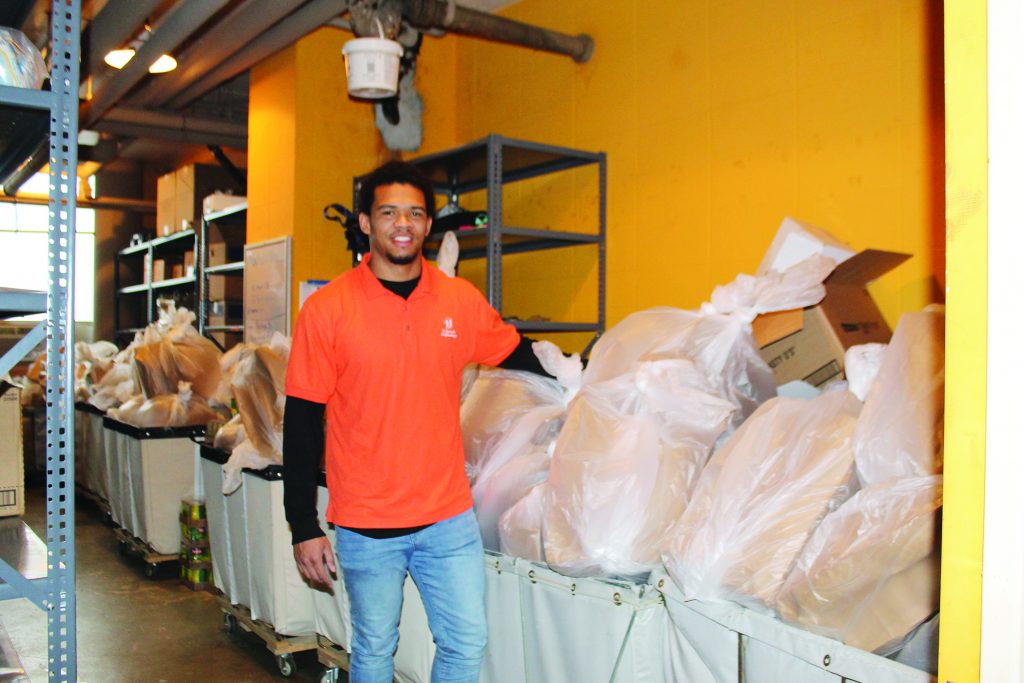Going the Extra Mile During COVID-19 St. Joseph Orphanage: Meeting Education, Mental Health and Basic Needs
by Eileen Connelly, OSU
Teachers, therapists and staff members at St. Joseph Orphanage (SJO) have been responding to the COVID-19 crisis with above and beyond dedication and compassion.
Founded by the Sisters of Charity of Cincinnati in 1829, SJO is one of the oldest child and family service agencies in the country. Today, the organization provides behavioral health, educational treatment and foster care services to hundreds of children and families each year, many of whom have experienced neglect, abuse or other forms of trauma.
“We serve more than 5,200 vulnerable children and families throughout Southwest Ohio, and they depend on us for essential care, such as education, therapy, case management, medication and food,” said SJO Chief Executive Officer Eric Cummins.
Going the Extra Mile for Students
As with other nonprofits, schools and business, the COVID-19 has impacted SJO’s routine, but not its commitment to students. Teachers and staff have been delivering food to students’ homes several times weekly, along with toiletries, medications and other essentials, said Tim McCoy, superintendent at SJO.
Additionally, they are supplying educational packets and activities designed to help build coping skills for anxiety, anger management and other skills development.
“Our teachers play such an important role in the students’ lives,” McCoy said. “A majority of our kids have a mental health diagnosis, and with the structure being off for them, we want to keep things as normal as possible. Not all of them have computers, so we’ve been delivering Chromebooks, if needed. Our whole community has really come together. “
“I’ve talked with all of the teachers and am really pleased with the response of my staff,” he added. “Our families are being put first, and I’ve been very impressed with the response of our
parents. They’re really responding, helping the kids with their academics and reaching out to us for help when needed and appropriate.”
In addition, teachers have been connecting with families several times a week to assess needs and concerns, answer questions, and to provide academic support, and they are using the online Classroom Dojo app to keep parents up-to-speed on weekly lessons and assignments. Teachers were also trained in video conferencing so that they can meet with students online for face-to-face meetings, and they are using YouTube channels to post lessons and instructions on how to complete lessons.
“I miss seeing my students in the classroom,” said teacher Adam Calez. “But we’re doing all we can to keep the learning going.”
Meeting Mental Health Needs
The organization also provides muchneeded therapy, case management, and medication to thousands of children across 10 Ohio counties. While SJO therapists and case managers usually meet with patients in-person, they have transitioned to using online telehealth technology to offer support and encouragement to patients and to reinforce coping skills that can reduce anxiety and depression.
“All of the students’ mental health needs are being met,” emphasized Dottie Bayless, assistant director of Day Programs at SJO. “All across the board, it seems like people are in good spirits.”
At Altercrest, the organization’s residential youth treatment facility, teachers and behavioral support specialists have been making a concerted effort to keep the small groups of students they work with actively engaged, while still observing social distancing and sanitizing procedures. April House-Beck, Altercrest principal, said teachers from the day program are working with the students, ranging in age from eight to 17. Rather than groups of six students, the adults are working with groups of four.
“Each classroom is set up to have its own space,” House-Beck explained. “We’ve talked to the students about what’s happening [regarding the pandemic] and had conversations about frequent hand washing and no hugging. We were initially concerned about behaviors because the students are out of their routine, but we’ve actually had fewer fights and arguments. They’ve been amazing.”
She noted that in spite of the challenges of continuing to provide services during the virus, some valuable lessons have been learned. “All of our staff members from different programs have really come together and there is definitely an open line of communication. Good things have been happening,” House-Beck said.
Supporting the Mission
While SJO is not requesting volunteers to assist with these efforts due to the need to practice social distancing, it is requesting donations to support its crucial mission. Donations can be made at www.stjosephorphanage.org/support/support-st-josephorphanage/ or mailed to:
St. Joseph Orphanage
ATTN: Development Dept.
5400 Edalbert Dr.
Cincinnati, OH 45239.
Donations will see SJO through this difficult time and will help to ensure that SJO can continue providing core services to those who so urgently need them. General, undesignated donations that SJO can use to fund operating expenses are of the greatest benefit right now.

alongside other education team members to be delivered to the homes of students.













